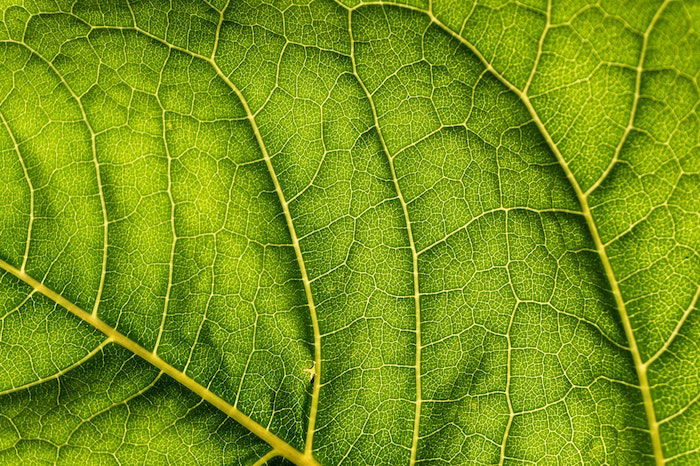Abstract macro photography refers to an image of something that isn’t easily recognizable. And macro photographers often achieve such results from everyday objects! These images exploit the use of patterns and colors. They arrest the eye and invite the viewer to explore the image.
Shooting abstract macro photography brings its own set of challenges. But with the right techniques and the right gear, you can create incredible photos that wow your viewers!
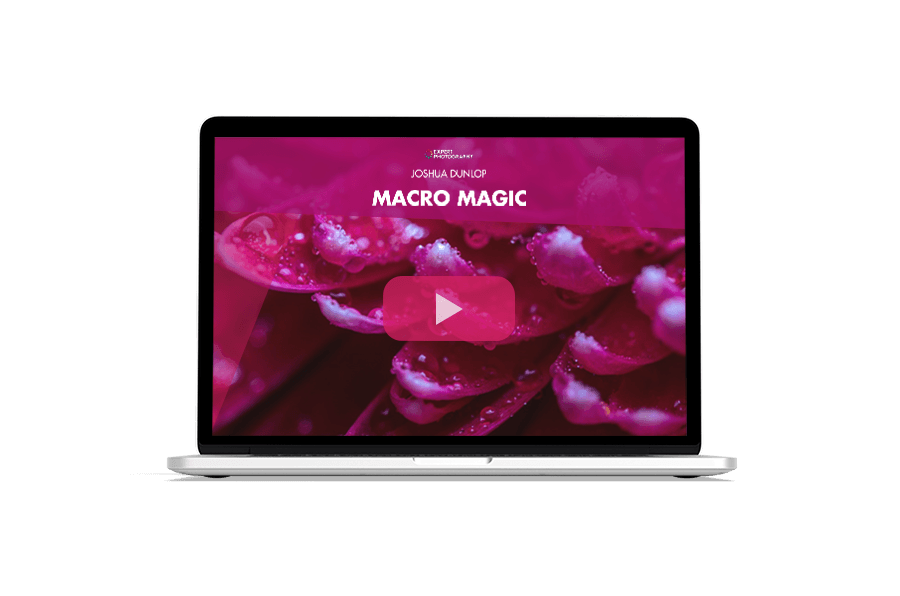
- Learn to take stunning photos without stepping outside.
- Discover affordable ways to convert any lens for macro shots.
- Explore unique techniques for lighting and composing your subjects.
What Is Abstract Macro Photography?
Occasionally, you’ll hear the term abstract applied to a photo that’s turned out badly. But for the most part, photographers deliberately shoot abstracts.
You can, of course, create an abstract image entirely on your computer. All you need for this is a creative software like Photoshop. But starting from a blank canvas can be difficult unless you receive a spark of inspiration.
For this reason, it’s often helpful to begin with a real-world subject. But your goal should be to use an unusual perspective. You can find inspiration for abstract photos almost anywhere. For example, you can find repeating patterns and colors in large, manmade structures.
But many smaller-scale objects can also provide a wealth of intricate shapes and textures. For many of us, these are less familiar and, therefore, more abstract.
How to Shoot Macro for Incredible Abstract Images
There are two ways you can use focus to create abstract images. We’ll talk about each in more detail below.
Shoot Intentionally Out-of-Focus Images
Most people don’t have the habit of closely examining objects with a magnifying glass. Therefore, close-up photographs of everyday objects can easily create interesting abstract compositions.
Let’s say you try shooting macro with a standard lens. As you get closer, you’ll reach a point where you can no longer focus on the subject. If you want a sharply focused image as the basis of your abstract composition, this would be a problem.
But we are trying to create abstract results! Using intentionally out-of-focus images can create incredible macro results. This can generate some abstract images whose nebulous forms emphasize the subject’s colors.
Remember to set your lens to manual focus so you can choose your focal point. If you use your camera’s autofocus, it will try to take a sharp photo.
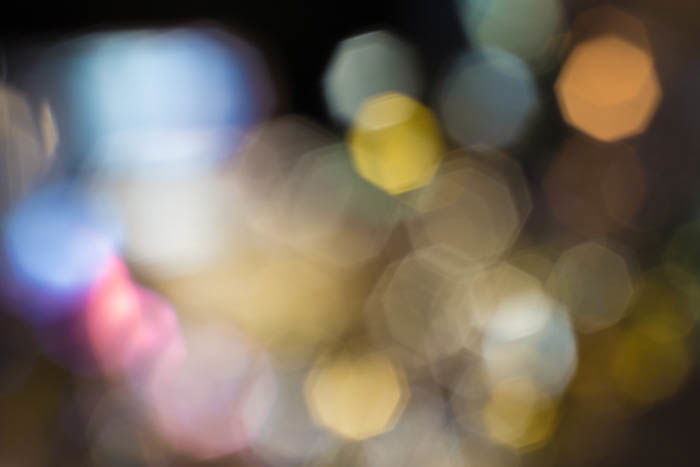
Use a Macro Lens for Pin-Sharp Images
To see the color and texture in rich detail, you need to focus much closer to the subject. For a standard lens, this is closer than the normal minimum focusing distance. But don’t worry, there are several ways to overcome this.
The best way is to use a dedicated macro lens. The image below is the same as the image above, but in focus and shot with a Canon EF-S 60mm f/2.8 macro lens. With this macro lens, we can fully appreciate the intricate form of its crystalline structure.
However, macro lenses can be expensive, which sometimes deters people from trying macro.
A cheaper way to get into macro photography is to use extension tubes. These increase the magnification of your lens by adding space between your lens and your camera sensor.
The other option is to use a reversing ring. These allow you to take your lens and put it onto your camera backward. This effectively changes the magnification of the lens, allowing you to shoot macro with the lens you already own.
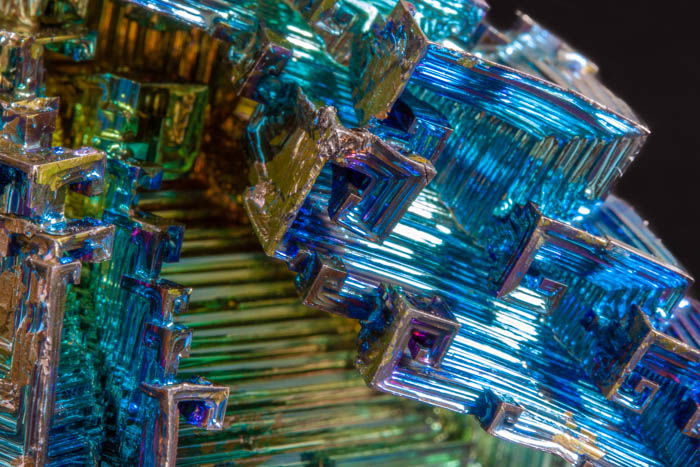
More Abstract Macro Photography Ideas
Colorful Stones
Gemstones and minerals are incredible for macro photography. Their colors, patterns, and textures offer endless opportunities for abstract photos.
Bismuth crystals are easy to photograph as they are quite large compared to other crystals. This sample is, in reality, about one inch across. You don’t need a high magnification or a complicated lighting setup. And you can easily find bismuth online or at any gem and mineral show.
Many minerals exhibit different patterns and colors depending on the angle of the illumination. Below is an image of labradorite.
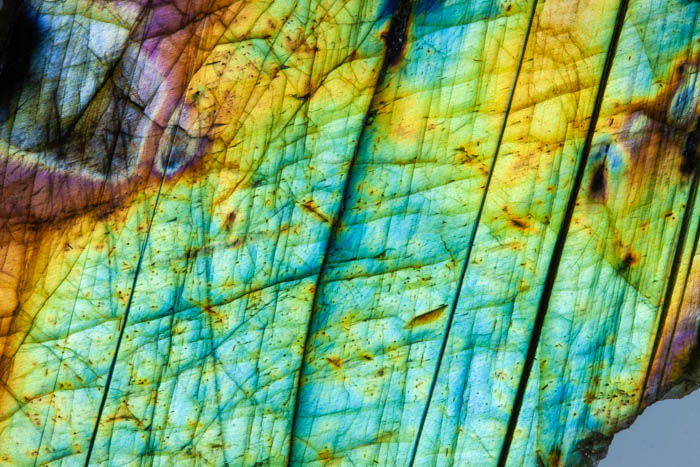
Recycle an Old CD for Awesome Effects
The microscopic pits on a CD are comparable in size to the wavelength of visible light. This makes it a fantastic source of abstract spectral color.
All you need is your camera, a tripod, and almost any small white light source. I shot the image below by placing a few drops of water on a CD and using an LED ring light as the illumination source. I mounted the camera on a tripod and moved the light by hand to achieve a good burst of color.
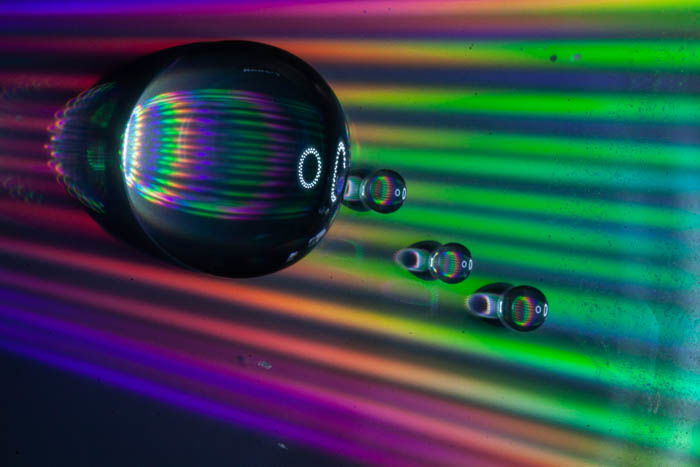
Experiment with Backlit Water Drops
A fairly common technique is to photograph oil or water on a pane of glass. But in shots like these, it’s the background that provides the colors. I’ve placed it several inches behind the glass so it’s out of focus.
Instead of lighting the background, make the background the light source itself. A tablet is perfect for this because you get to choose which colors are on the screen as well as the brightness of the screen.
Simply select a colorful photo on the tablet. Lie it face-up on a flat surface and set up a glass plate a few inches above it. Then drop some water or oil drops onto the surface of the glass and take some macro photos of the drops.
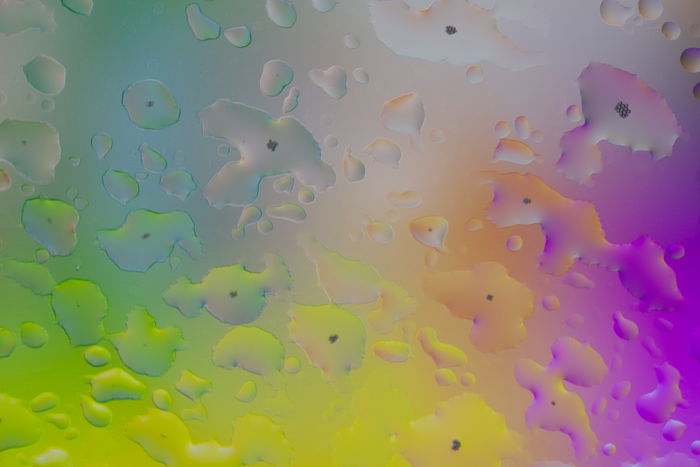
You can easily move your background photo around to achieve the background colors you want.
Add Oil Drops to the Mix
There’s a similar but even more exciting technique you can try. Instead of pouring just water directly on the glass, try adding a mixture of water and oil. Make sure the oil forms isolated drops on the water’s surface.
Each drop forms a tiny lens that distorts the background image to make abstract images.
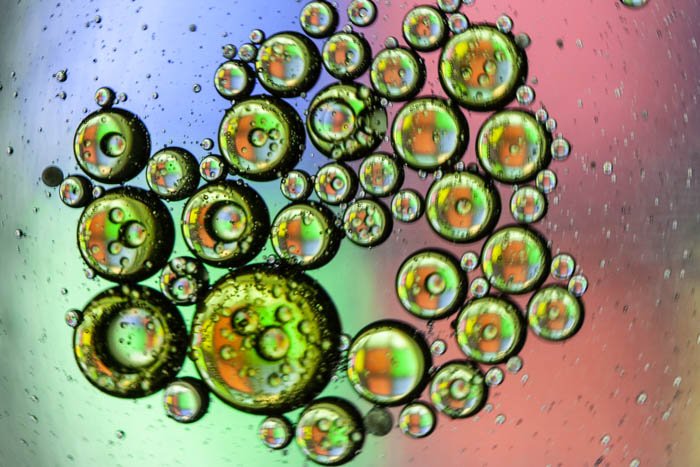
Shoot Abstract Flower Photography
Most macro flower photography involves taking fairly standard images of the petals and stamens of flowers. If you get lucky, you might get the chance to include an attendant insect or two.
One simple way to shoot abstract macro flower photography without expensive equipment is to use a relatively inexpensive LED light pad. For the image below, I sandwiched some petals between a glass plate and the illuminating LED panel.
The illumination is adequate, the subject isn’t moving, and the depth of field is good. Everything is sharp and in focus.
Once you have this setup in place, you can try photographing other objects. Thin slices of fruit and vegetables, such as oranges or cucumbers, are great for this technique.
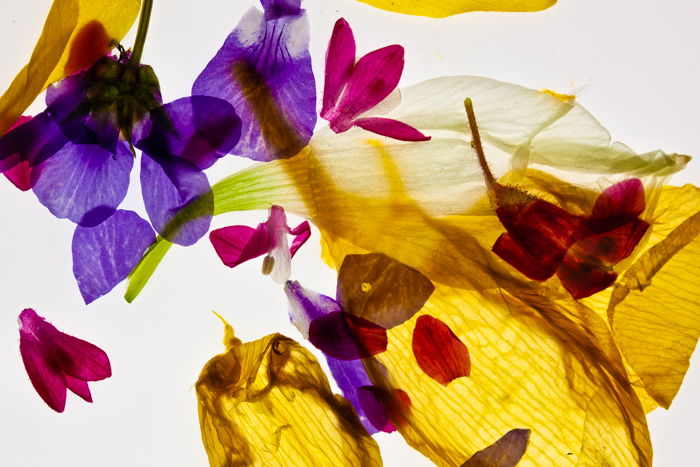
Use Kitchen Utensils
The average kitchen has a variety of gadgets and utensils. It may come as a surprise, but you can use them for your abstract macro photography project. Some of these gadgets have interesting shapes and shiny surfaces, which make them perfect subjects.
These tools tend to have patterns and textures. Try different perspectives and lighting techniques to highlight them. I used my tablet to create some colored reflections in this cheese grater.
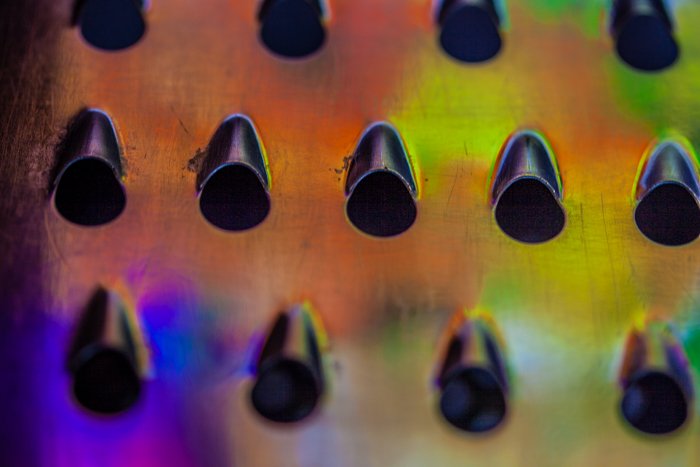
Conclusion—Abstract Macro Photography Ideas
Macro photography is all about transporting others into tiny new worlds. And abstract macro photography takes that a step further. It removes the confines of your photos needing to look photorealistic, giving you more opportunities to bring out your creative side.
Once you get into the abstract macro way of thinking, you’ll begin to see new works of art all around you. It’s just up to your creativity to take advantage of them!

- Learn to take stunning photos without stepping outside.
- Discover affordable ways to convert any lens for macro shots.
- Explore unique techniques for lighting and composing your subjects.
